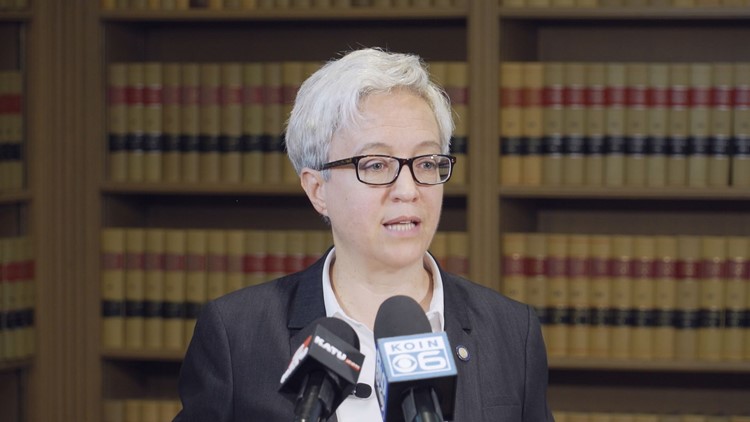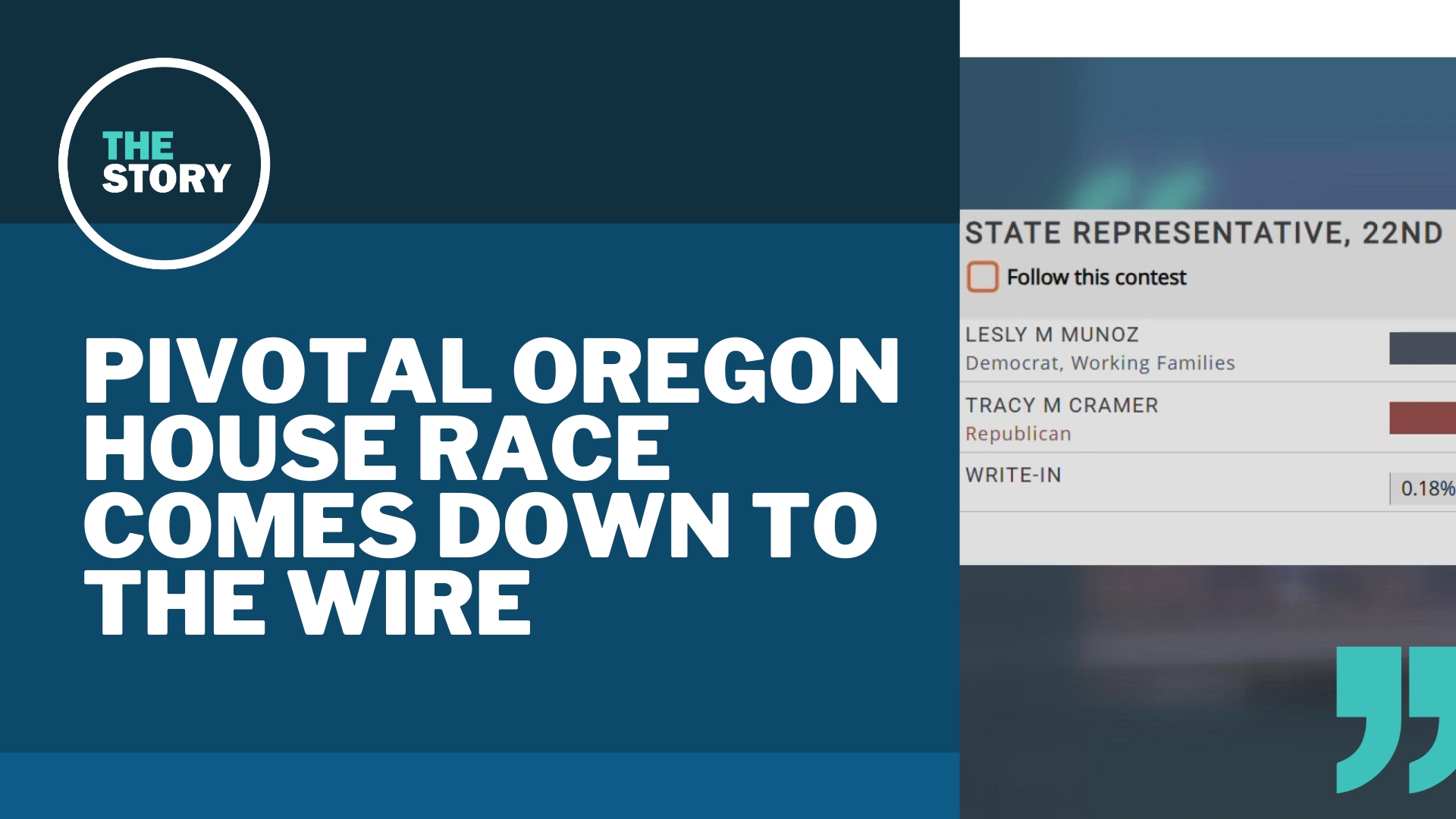PORTLAND, Ore. — Letters exchanged within the past several months suggest a significant disconnect between state and local leaders over how to deal with Portland's highly visible drug addiction crisis. Willamette Week was first to report on the exchange Wednesday.
In a letter dated May 25, Gov. Tina Kotek and Congressman Earl Blumenauer wrote to Portland Mayor Ted Wheeler and Multnomah County Chair Jessica Vega Pederson, referring back to a meeting they had in April to discuss the Portland metro area's behavioral health landscape.
"It was evident from the conversation that day that a change in strategy and deeper partnership will be necessary to achieve the kind of outcomes that we all want," Kotek and Blumenauer wrote. "There are well meaning efforts underway at the City and County to address the behavioral health crisis, particularly as it relates to substance use disorder and related behaviors and how they intersect with unsheltered homelessness and our criminal justice system.
"We do not have the luxury to have competing, duplicative, or uncoordinated efforts. We know that your combined leadership is more important than ever to achieve better results."
The governor and congressman went on to ask that Portland and Multnomah County work to break down barriers between the two local governments for a coordinated addiction response, headed by one person — something like an addiction czar — in charge of a small steering committee intended to "launch a bold, achievable plan of action" within 60 days of their first meeting.
"The committee should include input from first responders and street outreach workers, law enforcement, housing, and behavioral health providers (including the local Behavioral Health Resource Networks), and health system partners," they continued. "We would welcome the opportunity to determine shared metrics for success for this convening."
What Portland's got going on already
For over a year, Portland and Multnomah County have teamed up on an initiative called BHECN (pronounced "beacon"), the Behavioral Health Emergency Coordination Network. That's distinct from the Behavioral Health Resource Networks (BHRNS, pronounced "burns") mentioned by Kotek and Blumenauer, which are the addiction treatment organizations supported by Measure 110 funding.
BHECN was intended to bridge some of those gaps between the different local government entities, hospitals and nonprofits, in order to come up with a united front on responding to people suffering from a combination of substance use and mental health symptoms, often to the point of crisis. It's headed by a large executive committee, most of whom serve as bi-weekly participants on loan from their full-time jobs. Julie Dodge, formerly interim behavior health director for Multnomah County, was brought on as a consultant to provide more consistent attention.
The group's initial focus was on coming up with a way to replace Central City Concern's sobering station, shuttered at the beginning of 2020. But BHECN's first offering, a proposal announced by Mayor Ted Wheeler to open a brand new 24/7 polysubstance stabilization center in 2023, was met with crickets by the organizations expected to open and operate such a thing. BHECN has since pivoted to taking on the problem in less ambitious, more bite-sized pieces.
It isn't clear that Kotek and Blumenauer were at all referring to BHECN, an organization that thus far has had a fairly specialized focus, when they talked about the city and county appointing a top-down team to lead the addiction crisis response, even if it ticks a number of the boxes they outlined.
Regardless, Wheeler and Vega Pederson seem to have taken it that way. In a response letter dated June 5, the two local leaders gestured to BHECN and suggested that they need much more in the way of state and federal funding to deliver on the promise of what Portland and Multnomah County already have in place.
"We can attest to the rampant fentanyl and polysubstance drug use and overdoses that have decimated parts of our community over the past two years," they wrote. "We are working hard to address this growing issue, but no single jurisdiction (including both City of Portland and Multnomah County) is adequately funded or staffed to address the rapidly evolving challenges we face. Our long-standing efforts to address substance use provide a solid foundation upon which we can continue to build."
The city and county fire back
The mayor and county chair did not directly address Kotek and Blumenauer's request for an addiction czar and steering committee. What they did do, however, was catalogue how the state could allocate funding and cut red tape in order to help Portland and Multnomah County make headway.
First, Wheeler and Vega Pederson want state funding to launch three different types of facilities that BHECN has identified as necessary: 24/7 crisis stabilization centers for adults with acute intoxication and mental health symptoms — the proposal most similar to the original plan, but probably at a smaller scale — 24/7 intensive residential treatment and stabilization services, and stabilization centers with shelter space for people to sober up from substances where behavioral health needs are less acute.
RELATED: At the intersection of homelessness, mental illness and addiction in Portland lies psychosis
Next, the local leaders want enough state funding to help pay competitive wages for necessary medical, mental health and addiction recovery staff. That's no doubt a response to the statewide staffing shortages in this field, as many behavioral health organizations struggle to retain or recruit qualified workers.
Wheeler and Vega Pederson also want the state to cut down on how long it takes for drug treatment providers to get licensing through the state: "Providers have expressed that it is taking six months to receive a license," they said. On top of that, they want the state to open or license more residential treatment facilities and adult foster homes.
A last request, presumably aimed more at Blumenauer, is for an easing of federal restrictions on coordination of care in drug treatment so that it's allowed at the same level as it is for mental health.
"We cannot fully address the issues you have named or institute the actions you have requested without true State and Federal partnership," Wheeler and Vega Pederson concluded. "We invite you and senior agency leaders to join us in addressing these issues. We look forward to the collective impact of local, state and federal action in addressing the crises on our streets."
KGW reached out to Gov. Kotek's office for a response. While they did not provide any specific comment on the letter, a spokesperson said that Kotek is still meeting regularly with Wheeler and Vega Pederson to discuss pressing issues.
Next steps
Even though Wheeler and Vega Pederson don't appear interested in appointing an addiction czar, there are recent signs that BHECN is making progress on expanding its focus and looking to create a more integrated network for responding to substance use and behavioral health needs in Multnomah County
On June 30, BHECN put out a call for partners who can provide a range of related services in Multnomah County: crisis and stabilization, residential and outpatient treatment, sobering, peer recovery support services, and shelter or transitional housing.
“There is a crisis on our streets, and addressing it is a top priority for Multnomah County and for me,” said Vega Pederson in a July 17 statement. “This process moves us towards a more complete network, one that helps stabilize those in crisis, provides treatment and support services, and a path to housing. I’m committed to the partnership and collaboration the development of this continuum will take — and confident this next step advances our shared commitment across many systems and jurisdictions.”
Organizations that respond to the proposal and receive contracts will have seven years of procurement authority to add, expand and improve services. The county said that movement on planning and distributing funds will happen "much quicker" than that seven-year horizon.
"Contracting work could begin as soon as this fall once the qualified pool of providers is established, depending on the response to the solicitation," the county said. "This approach allows the County and its partners to not only take immediate action, but make continuous system improvement throughout the next seven years."
Right now, Multnomah County has committed $2 million each year to supporting services through BHECN, but officials indicated that this amount could go up as needed. Portland has pledged $1.8 million, also with the potential for more. The county suggested that other funding could come from Health Share of Oregon, CareOregon, and state or federal sources.
"This is life saving work," added Wheeler, also on July 17. "As cities across the State of Oregon continue to suffer from a dire lack of mental and behavioral health resources, the City of Portland and Multnomah County are working together to bring immediate stabilization resources online to serve Portlanders experiencing intoxication, reactions to substance use, and/or behavioral health issues. These resources are desperately needed in our community and I am grateful to prospective service providers who are willing to step up to help care for Portlanders in crisis."
After the last proposal from BHECN failed to get any takers, it's not clear if this one will fare better. However, the text of this proposal suggests that they have cast a wider net this time — looking to bring in whatever providers they can to fill some of the Portland area's many substance use and behavioral health needs.



